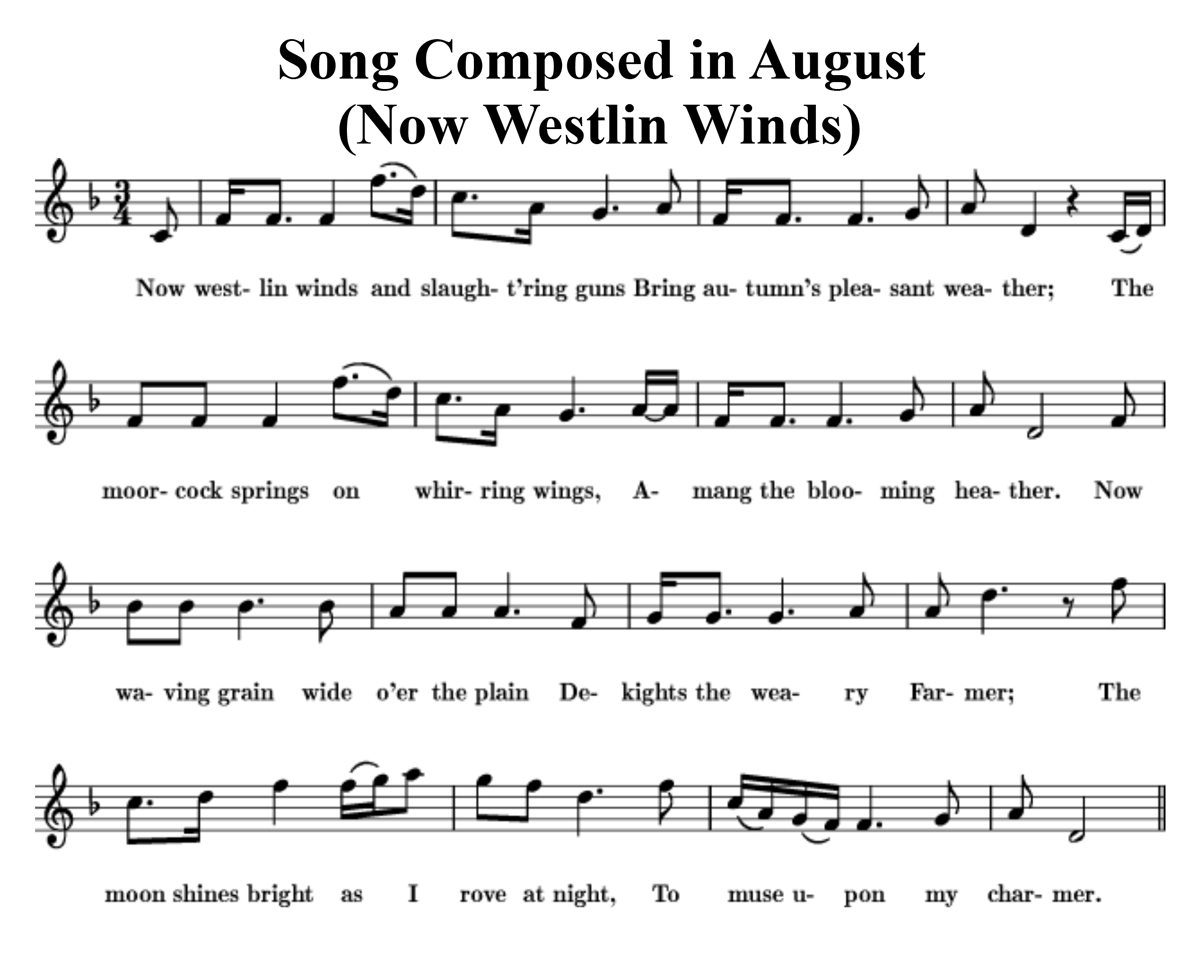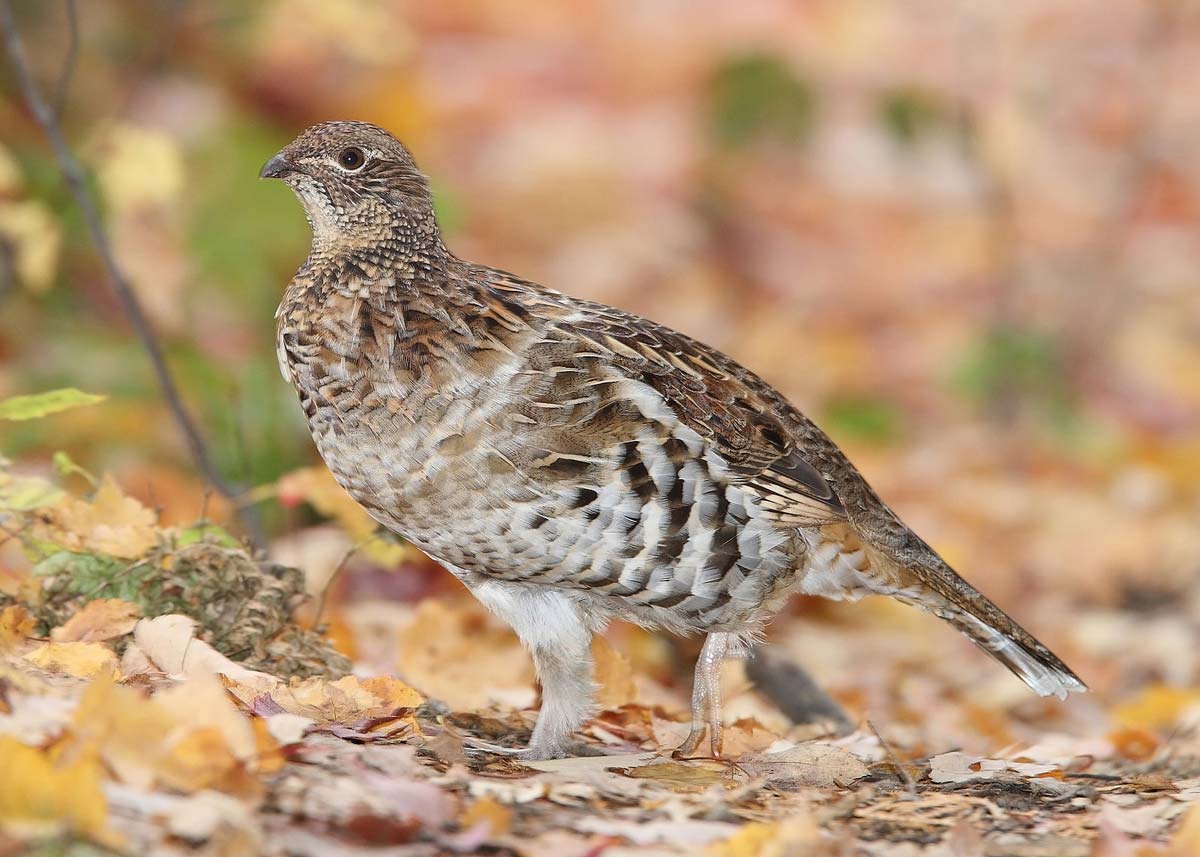(Now Westlin Winds)
by Robert Burns
Introduced by Andrew Calhoun
This was first published in the Kilmarnock edition of Robert Burns’ Poems: Chiefly in the Scottish Dialect, in 1786. Burns’ first draft was written ten years before in 1776. Robert was then 17 and its addressee, Peggy Thomson, of Kirkoswald, was 13. Burns indicated that it was to be sung to the tune of a humorous Ayrshire ballad, “I Had A Horse, I Had Nae Mair.”
Here is the first verse of the model:
‘I had a horse, and I had nae mair,
I gat him frae my daddy;
My purse was light, and my heart was fair,
But my wit it was fu’ ready.
And sae I thought me on a time,
Outwittens of my daddy,
To see mysell to a lawland laird,
Wha had a bonny lady.’
Mr. Burns later sent his lyric to The Scots Musical Museum, indicating that it could be set to the tune, “Port Gordon.” Scholars for well over a century have taken this gesture as evidence that Burns was disaffected with his original choice, which has never been published with the lyric; but they are missing something. “I Had a Horse, I Had Nae Mair” (I Had No More) had already been published, with its tune, in the second volume of the Musical Museum, where it is song #185; James Johnson (and Burns) preferred not to repeat melodies, hence his flexibility. The tune to which this is now commonly sung is neither of those to which he assigned it. Robert Burns is unique among major poets of his time in composing to melodies; he played fiddle, and needed to become deeply engaged with a tune before he could write lyrics for it; he was also a major collector of traditional lyrics and tunes. I explain in the linked video why this particular tune is of inseparable artistic importance to this particular lyric.
Burns borrows phrases freely from Alexander Pope’s poem, “Windsor Forest,” from these lines written in 1704:
See! from the brake the whirring pheasant springs,
And mounts exulting on triumphant wings…
With slaught’ring guns th’ unwearied fowler roves…
Where doves in flocks the leafless trees o’er-shade,
And lonely woodcocks haunt the wat’ry glade.
Burns’ punctuation is as distinctively expressive as Emily Dickinson’s. An example is “all fading-green and yellow.” With the hyphen, only the green is fading, and the yellow stands out. This can be suggested by the singer, with a pause.
Here’s a version by Sheena Wellington, which showcases some of the birds mentioned.

Lyrics:
Note: Some of the words Burns uses may be unfamiliar – they translate as:
Westlin – western
Moorcock – grouse
Cushat – wood pigeon
Fell – level area on mountain
Hern – heron
Now westlin winds, and slaught’ring guns
Bring Autumn’s pleasant weather;
The moorcock springs, on whirring wings,
Amang the blooming heather:
Now waving grain, wide o’er the plain,
Delights the weary Farmer;
The moon shines bright, as I rove at night,
To muse upon my Charmer.
The Partridge loves the fruitful fells;
The Plover loves the mountains;
The Woodcock haunts the lonely dells;
The soaring Hern the fountains:
Through lofty groves, the Cushat roves,
The path o’ man to shun it;
The hazel bush o’erhangs the Thrush,
The spreading thorn the Linnet.
Thus every kind their pleasure find,
The savage and the tender;
Some social join, and leagues combine;
Some solitary wander:
Avaunt, away! the cruel sway,
Tyrannic man’s dominion;
The Sportsman’s joy, the murd’ring cry,
The flutt’ring, gory pinion!
But Peggy dear, the evening ‘s clear,
Thick flies the skimming Swallow;
The sky is blue, the fields in view,
All fading-green and yellow:
Come let us stray our gladsome way,
And view the charms o’ Nature;
The rustling corn, the fruited thorn,
And every happy creature.
We’ll gently walk, and sweetly talk,
While the silent moon shines clearly;
I’ll clasp thy waist, and fondly prest,
Swear how I love thee dearly:
Not vernal show’rs to budding flow’rs,
Not Autumn to the Farmer,
So dear can be, as thou to me,
My fair, my lovely Charmer!
And there, upon a mark of blood,
his brother he has slain.
See the widow tear her hair.
Hear her mournful wail;
Beware the lonely hunter’s fate
that makes her weep and rail.
Feel the lonesome summer’s wind.
Hear its mournful cry.
There’s many a youth whose life was spent,
all on the mountains high.
Andrew Calhoun is a gigging singer-songwriter/folk artist since 1975. He’s founder and president of Waterbug Records, Inc. since 1992. In 2012 he received the Lantern Bearer Award from Folk Alliance Region Midwest; in 2014, a Lifetime Achievement Award from the Woodstock Folk Festival. He’s currently (2017) at work on a Robert Burns songbook called Glorious Work, which will have 173 songs with background, translations and musical arrangements.


 Thanks to the Massachusetts Cultural Council for their generous support.
Thanks to the Massachusetts Cultural Council for their generous support.
 Isaac Banner
Isaac Banner Seth Tepfer
Seth Tepfer Christa Torrens
Christa Torrens Ellie Shogren
Ellie Shogren Sharon Green
Sharon Green Dilip Sequeira
Dilip Sequeira